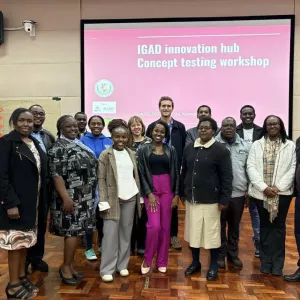From ideas to impact: Co-creating IGAD’s innovation hub for pastoralist resilience
Pastoralist communities across the Horn of Africa live and work in some of the world’s most challenging environments. Their livelihoods depend on adapting to shifting climate patterns, navigating cross-border mobility, and sustaining livestock-based economies that feed millions. The Intergovernmental Authority on Development (IGAD), with the Alliance of Bioversity and CIAT as a technical partner, is working to strengthen the tools,

From ideas to impact: Co-creating IGAD’s innovation hub for pastoralist resilience
Pastoralist communities across the Horn of Africa live and work in some of the world’s most challenging environments. Their livelihoods depend on adapting to shifting climate patterns, navigating cross-border mobility, and sustaining livestock-based economies that feed millions. The Intergovernmental Authority on Development (IGAD), with the Alliance of Bioversity and CIAT as a technical partner, is working to strengthen the tools, partnerships, and knowledge systems that can help these communities thrive in a changing world.
This vision is at the heart of BREFONS – Building Resilience for Food and Nutrition Security in the Horn of Africa – a regional programme funded by the African Development Bank and implemented in Djibouti, Ethiopia, Kenya, Somalia, and South Sudan. Within BREFONS, the IGAD Innovation Hub is being developed as a collaborative platform to connect innovators, researchers, policymakers, and practitioners, enabling them to co-design, test, and scale solutions for climate resilience, market access, and livestock health.

